On June 29, WFO Board member Ms Kati Partanen, the representative for the European Constituency, joined the IFAJ 2022 Congress – Smarter Farming and Food Production for Green and Sustainable Growth, hosted by the Danish Food and Agricultural Journalists (Denmark June 27-July 3) to bring the farmers’ perspective into the VIP seminar.
Kati Partanen is a Farmer herself, and a member of the Board of the Central Union of Agricultural Producers and Forest Owners, MTK Finland since 2011. She has served WFO as Facilitator of the Women Committee since 2013.
Kati is also working as a senior lecturer of farm economics at Savonia University of Applied Sciences. Her education is M.Sc in agriculture economics.
The International Federation of Agricultural Journalists (IFAJ) is a politically neutral, not-for-profit professional association for agricultural journalists in 56 countries.
The VIP panel discussion focused on a crucial question: how will we feed 10 billion people in 2050 and, at the same time, take care of the environment, climate and economy?
Ms Partanen started by expressing her appreciation for the invitation, recognising the central role of agricultural journalists as a very important partner for the farmers and farmer organisations “You are often interpreters of complex issues to a wide audience”.
Then she highlighted that “Farmers face challenges which directly impact their land and the food they produce such as pandemics, climate change, increasing costs and a growing population”. To have more sustainable, resilient, viable Food Systems, capable to feed a growing population and protect the planet, it is crucial to put farmers at the core of the food systems because:
- they are part of the solution to cope with and mitigate climate change effects;
- they take care of the land and are committed to protecting and restoring biodiversity;
- they are economic actors and they need markets that work properly at all levels to compete on a level playing field.
For all those reasons and many more, shaping and adopting farmer-driven policies and approaches is key to advancing the 2030 Agenda and achieving the Sustainable Development Goals.
WFO Board member Kati Partanen wanted to underline the centrality of Family Farming: Family Farms have proved to be a resilient way to produce food because every member of the farm is actively involved in protecting the environment and taking care of nature because it’s their home. Moreover, they boost the community’s livelihood ensuring not only fresh and nutritious food but also incomes and job opportunities.
She then remarked that Agriculture is one of the most international sectors: “even though production is very local, inputs and outputs are part of international markets. Also, agricultural policy and rules are very international. Food systems are based on global interlinkages”.
“We need Family Farms all over the world!” – WFO Board member Kati Partanen
Ms Partanen stressed the point that to achieve better stability, it is crucial to strengthen family farms all over the world while taking into account all sustainability dimensions (economic, social and environmental): “we need family farms all over the world. Developing nations need to have the opportunity to grow their agriculture and hence build rural communities’ resilience”.
The event was also the occasion for presenting once again to the audience the WFO policy paper on “The Farmers’ Route to Sustainable Food Systems”, approved by the WFO 2020 General Assembly.
She ended her speech by launching a challenge: to ensure a future for farming, it is essential that young people can see their future as farmers: “to develop family farms in all countries, we need to share experiences and knowledge! Here is a big role for agricultural journalists!”
